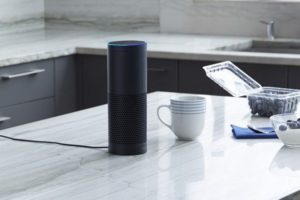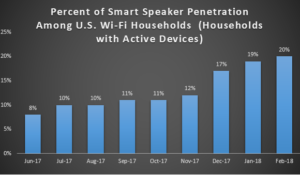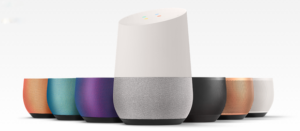With the release of the Echo smart speaker in late 2014, a new category of tech gadgets was born. Powered by Amazon’s (NASDAQ: AMZN) Alexa digital assistant, the device combined the artificial intelligence capabilities of voice recognition and language processing with a rudimentary speaker for home use. The voice-controlled Echo quickly became a hit with consumers, who used the smart speaker to stream music, set alarms, and order pizza.
The early success of the device quickly spawned competition, with Alphabet (NASDAQ: GOOGL) (NASDAQ: GOOG) releasing the Google Home in late 2016, and Apple (NASDAQ: AAPL) debuting its HomePod earlier this year.
Recent research suggests that the smart speaker, which was initially viewed as a novelty, is becoming much more mainstream.

The next must-have device?
Smart speakers can now be found in 20% of U.S. homes with Wi-Fi — which represents a 67% increase between November and February — according to data provided by comScore. That puts these devices in an estimated 18.7 million homes.

There are a number of factors that contributed to the recent uptick in adoption, including new device offerings and lower price points.
The Google Home Max and Home Mini were both announced in October and were available during the important holiday shopping season, with the Mini priced at $29 to take advantage of the seasonal demand.
Amazon stole Google’s thunder by announcing a variety of new Echo devices and price points in September. The company added the Echo Spot, a smart alarm clock that can do many of the same things an Echo can do, but with a 2.5-inch touchscreen that can also make video calls, and the Echo Plus, which has a built-in hub for smart-home devices. Amazon also offered its most popular device, the Echo Dot for $29 for the holidays.
Will it move the needle?
One of the more intriguing questions regarding these smart speakers is how they will contribute to the bottom line of their respective companies. Unfortunately, it’s complicated.
Apple is hoping to appeal to audiophiles and those already locked into its ecosystem. At $349, the HomePod is among the higher priced smart speakers, ensuring that Apple collects its typically high margins.
The Google Home retails for $129. At this point, it’s unclear how Google plans to monetize its devices. Company executives were asked that very same question by an analyst during the fourth quarter conference call, and CEO Sundar Pichai said, “There are a lot of interesting ideas internally … We see a lot of potential, but the guidance I’ve given the teams is to be squarely focused on user experience. We are really getting started … So, you’ll see us focused on user experience there for a while to come.”

Show me the money
Of the three, Amazon has the clearest path to additional revenue. Some suggest the company is making little or no money on the devices themselves, which range in price from $49 to $229 each. However, Amazon is using them to increase customer engagement, which appears to be working.
The ability to use voice control to order or reorder products directly from Amazon’s e-commerce website was a stroke of genius and it appears to be paying off. Independent research shows that customers that use the Echo tend to spend $1,700 annually, on average, much more than the $1,000 spent by the average Amazon customer, according to Consumer Intelligence Research Partners.
Amazon Music vice president Steve Boom revealed another way the company benefits from Alexa and Echo. He pointed to the growing base of smart speakers as a catalyst for increasing adoption of its Music Unlimited streaming service. Boom said the company had “tens of millions” of paying customers, and that its subscriber roles have more than doubled in the past six months.
Early days
It’s important to remember that it is still early innings for these devices and the full extent of their reach has yet to be seen. Amazon is offering the Alexa Development Kit to companies that want to include Alexa’s voice control into their own products. There are currently 50 third-party Alexa devices, but that number could soon spike to the hundreds or thousands. And that’s how Amazon wants it.
Alexa, are you becoming ubiquitous?


